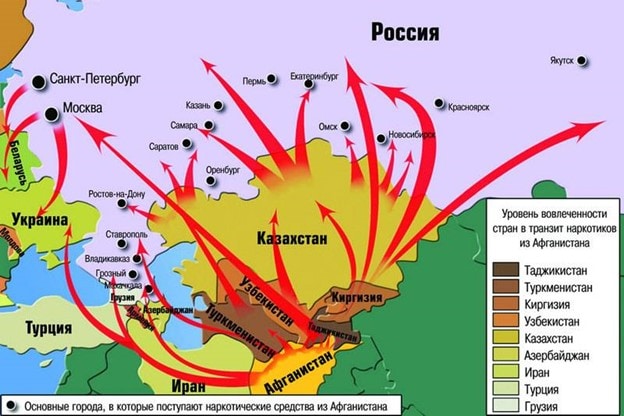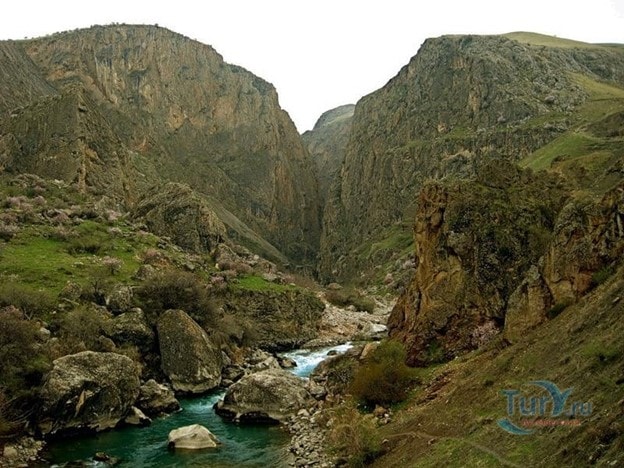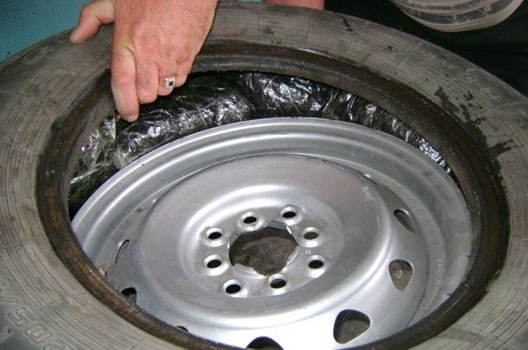Animosity is growing towards illegal migrants from Central Asian countries that were formerly Soviet republics. Migrant communities have been blamed for crime and bullying ethnic Russians.[1] Topwar.ru columnist Anna Kozireva identifies the migrants as the main conduit for drugs flowing from Afghanistan to Russia. She writes that though the Taliban had promised to combat the drug trade, since their takeover the drug trade has soared. Kozireva accuses officials in the Central Asian states of complicity in this profitable trade. According to the columnist, to reduce the flow of drugs, Russia must display firmness and abstain from good will gestures to the Central Asian states. Only students and qualified workers needed by the Russian economy should be admitted into Russia.
Kozireva's column follows below:[2]

Diagram showing movement of drugs from Afghanistan into Russia's major cities. Bar on the left ranks the degree of the countries' involvement in the flow of drugs in descending order Tajikistan, Turkmenistan, Kyrgyzstan, Uzbekistan, Kazakhstan, Azerbaijan, Iran, Turkey, Georgia. (Source: Topwar.ru)
"It is unlikely that someone fails to understand that one of the main threats that emanates from migrants arriving in Russia is the very real threat to put Russians on drugs.
Ferghana Is Not A City Of Grocery Products
"The Ferghana Valley is a mountainous inaccessible area chosen by drug dealers and smugglers. The Batken-Isfana highway lies at its southwestern tip. Most of the local population closely cooperates with various groups. Often this is the only way to somehow survive.
"Interestingly, in 2022, precisely this site accounted for all the major clashes between the Kyrgyz and Tajiks. After all, the secret mountain routes used for drug trafficking pass through here. Yes, there is no clear border between Kyrgyzstan and Tajikistan. But we must also consider the desire of each of the parties to snatch a 'fat' piece of the Afghan drug traffic.

Ferghana Valley (Source: Tury.ru)
"Even two dozen meters in favor of one of the countries affects the cost of tariffs for the 'transit' of heroin. Riskier is the transit from Afghan Ishkashim through the capital region of Tajikistan, Ravat in the Sughd region, and Kyrgyz Batken and Osh in the direction of Kazakhstan.
"By the way, despite the Taliban's declaration regarding the fight against drug production in Afghanistan, the volume of exports following their coming came to power in 2021 increased manifold. The director of the drug control agency in Tajikistan Khabibullo Vohidzoda said that since the Taliban came to power, the level of confiscated narcotic substances from Afghanistan has tripled (three tons as opposed to one).
Security Officials Remove Your Medals
SUPPORT OUR WORK

"Does anyone believe that the Tajik and Kyrgyz security forces are not involved in drug trafficking and do not know anything about the specified routes? Of course, in order to 'cover' their illegal activities, they can organize some kind of raid. For this reason, there is another route. It lies through the Wakhan Corridor of Afghanistan and the Pamir Highway in the Gorno-Badakhshan region (GBAO) of Tajikistan, and then Osh to the territory of Kazakhstan.
"But this route is more complicated and less profitable than the route through the Ferghana Valley. After entering Kazakhstan, drug couriers use the country's sparsely populated desert areas to move unnoticed to the Russian border. In poorly guarded areas, the goods reach their destination points in the Chelyabinsk (Troitsk) or Orenburg (Novotroitsk) regions, and then spread throughout Russia.
"Let me remind you that the Russian border guards left Tajikistan in July 2005. And before that, they controlled 1,344 kilometers of the Tajik-Afghan border. And is it mere coincidence that drug trafficking has been increasing constantly since then?
"It is interesting that the history of the protection of the Afghan border by Russian border guards begins in 1886, when the first Russian garrison was stationed in the Kerki garrison of the Emirate of Bukhara. From 1986 until the collapse of the USSR, the Task Force of the Red Banner Central Asian Border District (KSAPO) of the KGB of the USSR was located in Dushanbe.
"In 1998, the Group of Russian Border Troops of Russia in Tajikistan was transformed into the Border Group of the Federal Border Service. And later, the transfer of the border to the jurisdiction of the Border Guard Service of Tajikistan began.
How Do They Bring In These Drugs?
"Let's see what the media says. On January 19 of this year, Russian police officers in Ivanovo detained two Central Asian nationals with tangerines, which were used as containers for transporting illegal goods.
"It turned out that the accomplices hid the tangerines stuffed with methadone in the agreed places and sent the coordinates to the drug dealers in the messenger. They also transmitted information about the location to the customers who paid for the goods. In addition to drug addicts, 30 bundles of hashish were found in the cabin of their car.
"A citizen of Tajikistan, detained at the airport, had a one-kilogram bag of pistachios in his hand luggage. Upon closer examination, it turned out that instead of kernels, the nuts contained small bags of hashish.
"'In addition to nuts, more often walnuts, citizens of Tajikistan often hide illegal cargo in bulbs and pomegranates. You can easily hide contraband in a batch of potatoes. And the flatbread, in which the drugs were transported, belonged to a citizen of Uzbekistan. He was carrying seven of these loaves in his hand luggage, and one contained 700 grams of heroin,' customs officials said.
"The drug couriers' imagination is impressive. Drugs are transported with food products, packed in a condom and transported in the stomach, [hidden] in women's hair, shoe heels, suitcase handles... The list is huge. They love to carry opiates in watermelons and melons. Sometimes the whole truckload of watermelons is filled with drugs.

Drugs secreted in tire of driver from Tajikistan (Source: AltaiS.aif.ru)
"The drug business is profitable, and a person is capable of a lot in the pursuit of money. Law enforcement agencies know the main ways of transporting drugs, so those who are interested in distributing substances come up with new ones. On April 11 of this year, the transport police of Vorkuta detained men, each with five bundles of hashish with a total weight of 535 g. One of the detainees had bags in the lining of his down jacket, while the second had them sewn into the collar of his winter jacket.
"I clearly remember the Federal Customs Service exhibition in the State Duma. It featured items used to transport drugs. They had everything there: books, watches, shoes, necklaces, brooches, cameras, headphones, phones, laptops, playing cards. In particular, there were many fruits and vegetables: from apples and melons, to cabbage, onions, and garlic...
"But often the drug couriers' impudence is off the charts. Not so long ago, in the city of Vyazma, police officers stopped a Hyundai Solaris vehicle for inspection. There were two natives of Central Asia in the car. They were transporting heroin weighing more than 250 grams worth a quarter of a million rubles... We can say that these citizens did not even [bother to] hide the drug...
"Well, what about it? Here is an even more interesting case: two years ago, Azamkul Nosirov and Alisher Odinaev, working as conductors of a passenger train on the Dushanbe-Moscow route, placed more than 30 kg of heroin in the recesses of a wagon entrusted to them in Tajikistan. After the train arrived at the Aksaraiskaya station, drugs were found and seized by the Russian FSB border department officers. So they simply transported it in the train car, fearing nothing! And they found a 'cache,' apparently because their competitors handed it over to them.
And How Does One Deal With It?
"The fastest, simplest, and most radical method is the prohibition of uncontrolled migration, the abolition of visa-free travel. Entry into Russia is allowed only on a work or study visa for citizens of the specialties needed by Russia and with the relevant verified qualifications.
"And of course, there should be no illegal migration, the border should be locked up. And in no case should amnesty be given to those migrant workers who have already been expelled from Russia once. But there must be a firm political will for this, and no kind gestures towards these or other very independent states of the former USSR!
"Let me also remind you that in June 2019, Russian President Vladimir Putin said that he did not consider it necessary to reduce the punishment for drug-related crimes. Instead, control over the activities of agencies engaged in the fight against narcotics offenses should be strengthened.
"'There can be no liberalization here... The most important thing here is to establish control,' the president added."
[1] See MEMRI Special Dispatch No. 10617, Dmitry Popov, Columnist For Russian Daily 'Moskovskiy Komsomolets': Labor Migrants Have Opened A Second Front Against Russia, May 17, 2023.
[2] Topwar.ru, May 20, 2023.




